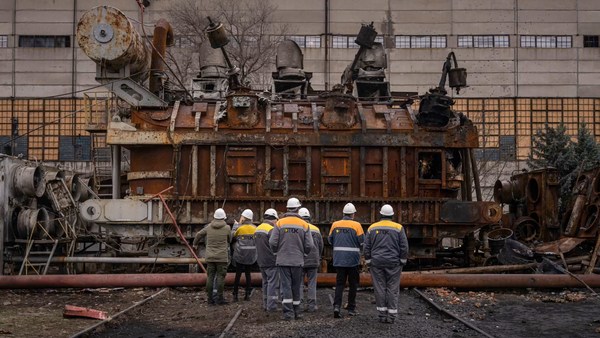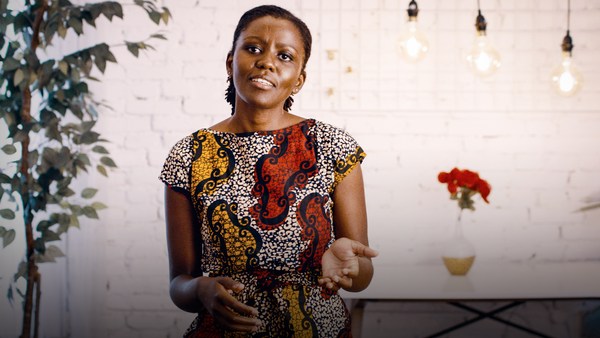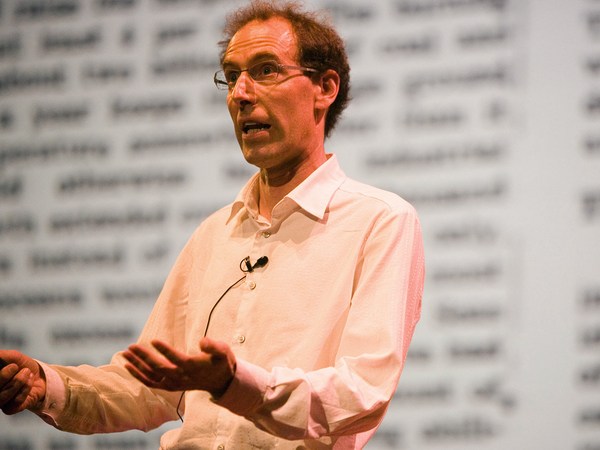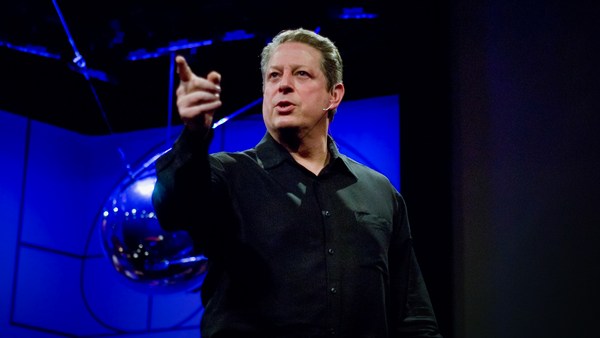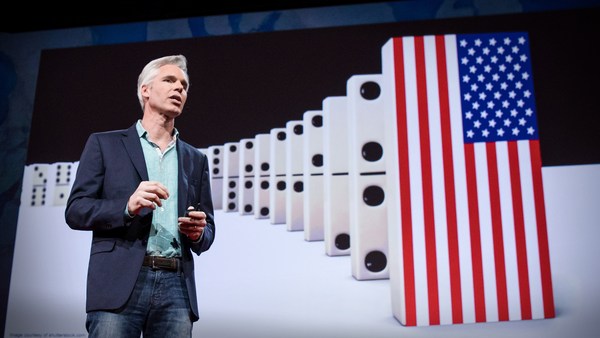I want to present to you the Bridgetown Initiative. It’s a pragmatic, ambitious plan to save the world that's been gaining surprising traction. I’m going to start with a “who,” move to the “what” and “where” we are.
I came late to climate. I wasn't a skeptic. I'm an economist. We believe that if we don't value something well enough, we tend to overconsume it. I believe that. I just wasn't seized by a compulsion to do something about it myself until September 18, 2017. I was sitting in the departure lounge of JFK, waiting to go home to Bridgetown, Barbados, nursing a coffee, and my phone buzzes. And it's Mia Amor Mottley, college friend and then-leader of the opposition of Barbados.
“Go to Dominica now,” she says. Our neighboring island. "They've just been smashed by Hurricane Maria. They need all the help they can get. Time for you to step into the shoes of that previous generation of influential development economists. Just like your dad." She's compassionate, super smart, and obviously a good politician because I am on a UN relief plane the next day, doing a hairpin turn to land on the emergency airstrip in Dominica. The pilot's last mission was dodging missiles in Syria, so I'm feeling fairly safe. I have my head wedged against the window transfixed of what's below.
A hurricane can release the energy of 10,000 nuclear bombs. And below me is a nuclear wasteland. Pointing up towards me are a million thin white sticks. Takes me a moment to realize they’re trees stripped bare of all branches, leaves and bark. When we land, I’m assaulted by the smell of burning and decomposition. And something else it takes me a while longer to work out. I'm on a tropical island, normally teeming with birds and insects and color, in deathly, monochrome silence. The birds have gone. The land is emptied.
Later, Dominica's Prime Minister Roosevelt Skerrit says, "Dominicans have lost everything money can buy in four hours." The government's job was to make them feel that what was left was the valuable stuff -- community, family, hope -- and to help them repair. Because if despair set in, then a bad, bad situation would get worse.
Early on I work out that the way to get recovery funds flowing is to make Dominica matter to the world. So Dominica declares they will rebuild as the world's first climate-resilient nation. They dust themselves off, stand tall and resolute, and invite the world's experts in. Turns out, the Dominicans have the real insights. We made a list of all the things they had to do in the immediate aftermath of the disaster and asked what would they have to do now so they wouldn't have to do that next time around. And the answers kept on heading higher. Energy and health resilient systems. National and regional food security and then the global, because there's no real alternative to halting climate change.
And that's why the world's biggest plan, the Bridgetown Initiative, comes partly from the world's smallest countries. And it actually makes even more sense to that, because tropical places are where temperatures, droughts and sea levels will rise to their highest, most extreme levels. We are the canaries in the mine and we can see there's no point gasping for air for ourselves. We have to save the mine.
And we can also see what’s getting in the way, because whilst most people believe climate change is here and happening and urgent, they also believe someone else should be doing more about it. Rich countries are electrifying, shifting, reducing, so much so that the majority of greenhouse gas emissions, 63 percent and climbing, are now coming from developing countries. There is now no pathway to avoid the world's destabilizing planetary systems without the green transformation of developing countries.
The rich say to the poor, "You need to ban emissions, tax carbon, shift into renewables and get with the program." But that would slow the growth of developing countries. They'd have to borrow a lot at very high interest rates to invest in the new, decommission the old, find new jobs for old coal miners and more. And why should they? The rich cause global warming. They're responsible for 70 percent of the stock of greenhouse gases in the atmosphere for using up 60 percent of the world's carbon budget. You can't scoff 60 percent of the cake and then say afterwards, "Well, we all need to cut back now."
(Laughter)
Don't cement inequality.
(Applause)
"Don't cement inequality," the poor say, "Send aid." The problem is that all of the aid in the world will not fund one twelfth of the green transformation in developing countries. And rich-country governments are not getting elected to send money to foreigners. They're getting elected to deport foreigners. So we're stuck, staring at each other, pointing fingers whilst the world burns.
I figured that the way to break this impasse is if we stop only looking at ourselves and make the cost of resilience so cheap, the flow of finance after a disaster so immediate, the green transformation of developing countries so profitable, that we turn reluctance into a scramble. There's no extra time. We're on countdown. And that is the essence of the Bridgetown Initiative.
During COVID and the global financial crisis, rich countries purchased 24 trillion dollars of bonds to pump their economy. If instead, they'd purchased 24 trillion dollars of bonds that finance renewable energies, we would have had the same economic impact and be halfway to halting climate change already. And we would have reduced our inflationary dependence on oil and coal, all within 12 years. The power of what we can do when it matters to us is unlimited.
So here's the financing plan that does not rely on the altruism of financiers and insurers, is not based on some unproven tech and does not skirt around our common but different responsibilities. Picture three buckets. Small, medium and large.
The smallest is actually the hardest to fund. It's all of those things that don't generate any savings or profits. It's rebuilding the homes of low-income families that are being washed away by climate events. It's rebuilding, recovering their livelihoods, their clinics, their schools. And climate change, remember, is the increasing certainty of rising losses. It's uninsurable. So we need new sources of public finance. We need new emission taxes on oil and coal and methane. At the Mottley-Macron Summit in June in Paris, we made some progress towards taxing emissions on the shipping industry. We need more. And we need a small financial transaction tax, like the one you don't even realize you're paying today, that covers the cost of the US SEC. And energy and finance consumption is slanted to the rich.
The second bucket is for those things that don't generate revenues but generate immediate savings. If I invest a dollar of borrowed money on stronger seawalls, more muscular flood defenses, more resilient health systems, I save several dollars. So we need the international multilateral development banks, like the World Bank, to lend three times more on the Sustainable Development Goals and to make that debt cheap by making it longer and lower-cost. They can get halfway there by using the resources they already have. They're very conservative. And the other half, they need rich countries to put in a little bit more capital. Now, some people criticize me for saying, why are you going for cheap loans rather than grants? And I say, if you found a trillion dollars stuffed behind the sofa, then OK. But grants will never be enough. And so let's focus our grants on those things that can't be funded any other way because there's no savings and profits.
The final bucket, the biggest bucket, is for those things for which there is a revenue attached. But before I go to that, on the second bucket at Paris, at the Motley-Macron Summit, we got a commitment of an extra 20 billion dollars of lending a year, a start. The third bucket, the biggest, revenue. Solar farms, wind turbines, they make money whilst reducing greenhouse gases. In the rich countries, 81 percent of that is funded by the private sector. If we want developing countries to move faster than rich countries do, then we want those investors to go to the developing world. They don't today because of the high cost of guaranteeing their returns against the fluctuation of currencies. However, history shows that an international agency capitalized by rich countries that takes a diversified view across time and countries can lower the cost without losing money ... by enough to unblock the flow of investments. And a small group of countries have agreed to move on a pilot this year.
Three buckets: small one for costs, middle one for savings, big one for revenues. There are a couple of things we also need to do that doesn't cost money. We need Barbados-style pause clauses in all debt instruments. When a disaster hits, you suspend -- your interest payments and debt repayments are suspended for two years, added back on to later when you can afford it. It will release billions of dollars and reshape the financial system. And as Prime Minister Mottley says, if we want these institutions that were set up in the colonial era, if we want to trust them to save the world, then the people they serve cannot be invisible in the halls of power.
(Applause)
So the impasse is cracking. I got on that plane to Dominica because of my dad. Not because of his profession, but because he was a dad. I remember asking him once, when I was being asked to join an unpopular cause that was going to hurt my career, and I was half hoping he would say, "No, son, that's silly." Instead, he said gently, "Avi, you've got to be a player in this life." So here I am.
Please join us.
(Applause)
